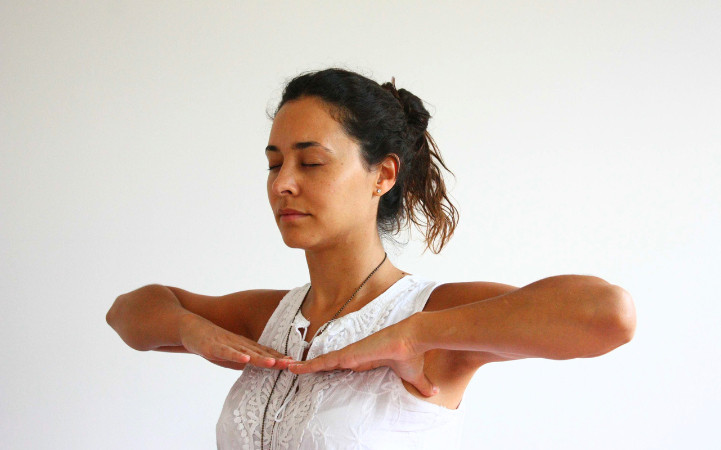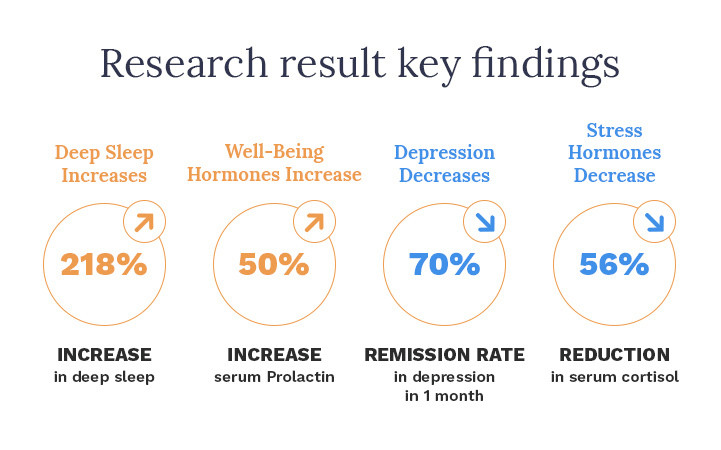
Neither at home nor at school did we learn how to properly deal with stress.
Math, gym, and science. Yes. But stress? Nope.
Consider this:
How did your former school teacher handle that unruly classroom…(yelling?)
How did your parents deal with their work fatigue…(TV binging?)
Or those traffic jams…(swearing?)
And what about your adolescence…(Ok, we don’t actually need to go there!)
But you get where I’m going with this, right? We can hopefully agree that yelling, shutting down, and swearing aren’t the most effective ways to deal with stress. Reactive? Yes. Effective? No.
Because let’s face it, those cortisol levels are NOT dropping while anyone’s busy fuming.

So here’s the thing.
We learn to walk by watching others walk. We learn to talk by listening to others talk. And in the same way, we learn to deal with stress by watching others deal with stress.
Now, let’s pause. Reflect honestly and truthfully. What were your examples of how to deal with stress as a child? In school, at home, and in pop culture during your prime developmental years.
My memory says that the overall stress-response was grim. I can pinpoint tough situations that were brushed under the rug, festering into future woes. I can remember instances when anger took reign, and things were said that shouldn’t have been said, and things were done that shouldn't have been done.
So we find ourselves here, generation after generation of family, friends, and loved ones reacting to stress, but not actually dealing with stress.
What to do 🧐?
Let’s unpack by starting at the very beginning…
What is Stress?

You know exactly what stress feels like (on a scale from uncomfortable to absolutely terrible). But what exactly is stress?
Well, stress is a physiological and emotional response to the challenging situations we face in our daily lives. Whether it’s dealing with an ever-flooding inbox with “urgent” subject lines (can we save that word for actual emergencies, please?), the rising cost of living, or simply observing the current (and violent) state of the world (deep, deep sigh…), our stress response is being activated on repeat.
Often referred to as "fight-or-flight", stress helps us deal with perceived threats. And while stress can be super helpful in short bursts (👋 hello productivity, nice to see you again!), prolonged activation can lead to various health issues.
In fact, according to WebMD, stress is a primary catalyst for a wide range of health issues and illnesses. Did you know that a staggering 75-90% of doctor's appointments are linked to stress-related symptoms?
Signs of Stress

Whenever we’re aware that we’re feeling stressed—which means that it hasn’t completely taken control just yet—it gives us the opportunity to respond to stress rather than react to it.
(I’ll share more about how to do that soon, so hang tight!)
Why is this important?
Well, our prefrontal cortex gets completely flooded with cortisol, the stress hormone, whenever we’re feeling stressed. This means that the decision-making faculty of our brain gets compromised, and essentially, we’re no longer capable of making wise decisions.
In this foggy and compromised state, we move from using our wizard brain 🧠 to our lizard brain 🦎, which is the primitive and non-rational part that signals fight-or-flight.
Ever get to an exam that you studied all night for, only to go completely blank?
Or prepare for a speech that you completely forgot at the podium?
You got it. Lizard brain is on the rise!
Now, before we debunk how to cope with this stress mess, let’s go over a few of the most common signs:
Physical symptoms: headaches, muscle tension, fatigue, digestive issues, changes in appetite, sleep disturbances
Emotional symptoms: anxiety, irritability, mood swings, feeling overwhelmed, lack of motivation
Cognitive symptoms: difficulty concentrating, forgetfulness, indecisiveness, negative thoughts
How to Reduce Stress

To properly reduce stress, it’s great to get a bird’s eye picture of what’s really going on in your life. Because the thing is, what may cause stress for you may not be a source of stress for someone else and vice versa.
Becoming more aware is key to emotional well-being.
As the Art of Living Founder, Gurudev says, “Stress is too much to do and too little time or energy. When we have too much to do and not enough time or energy, we get stressed.”
So I’d say the first step to reduce stress is choice.
Evaluate. What is taking up your time and energy? And then decide what makes sense to weed out, according to your needs and inner compass. Maybe it’s time scrolling on social media. Or certain work tasks. Or relationships that are taking up too much time and energy.
Only YOU know what feels right for you and what doesn’t.
In addition—and in tandem—raise your energy.
Knowing how to raise your prana (aka lifeforce energy) will make a world of difference in what you can handle in your day-to-day life. For this, what made a world of difference for me was learning SKY Breath Meditation through the Art of Living Part 1 Course.
Having this daily life practice has given me the key to a calm, collected, and centered state of mind, and in turn, my stress levels have dropped dramatically.
By the way, this SKY technique is practiced by over 45 million people across 182 countries. And it’s the most extensively researched breath-based meditation practice in the world. Check out these incredible stats:

Of course, healthy diet and lifestyle choices matter, too. But I will assume you already know that you should be getting enough sleep, exercising regularly, and eating healthy 😄
Ways to Relieve Stress

Going back to the wizard 🧠 and lizard brain 🦎 (rational and non-rational), the best way to relieve stress is to go back to your breath.
You see, when we practice deep breathing exercises, the vagus nerve gets activated, which essentially acts as a drain to the cortisol levels (stress hormone) that have flooded the prefrontal cortex. Once the cortisol levels are reduced, you’re back (!) and empowered to make wise choices again—rather than reactive primitive ones.
Within minutes, practicing simple breathing exercises can be highly effective at regulating your nervous system. And actually, you can learn a few for free with this 6-day breathwork journey:
But best of all is starting the day fresh with my SKY Breath Meditation practice. It makes such a difference with how my entire day pans out, and it’s at the very top of my to-do list each day.
How to Relieve Stress for Women

Ladies, we know that we’re wired differently than men. And I don’t mean to sound hippie-dippie, but our hormones do fluctuate with the moon's cycle and our menstrual cycle, too (when still applicable).
I highly recommend cultivating a lifestyle that’s aligned with the natural cycle of your body. This way, you’re not fighting with yourself when your energy naturally dips (winter season), and second-guessing yourself when your energy is ready to rise (summer season). There’s such magic in how we’ve been designed!
Do the reading, and see what little changes you can make to your work, family, and even social life based on how you’ve been designed by nature. There’s a lot less stress when you’re gentle with yourself and in tune with your body, making just enough room for inner and outer expression.
(For the men reading this, the women in your life will appreciate you taking the time to learn how we’re designed to be at our best. So don’t be shy to dig in 🙂)
How to Relieve Stress for Men

Well, I definitely don’t want to be woman-splaining and pretend that I know the stress-less secret for men without having a lived experience. But what I can share from my own personal observation is:
It’s ok to relax. It’s ok to be honest. And it’s ok to be vulnerable.
In fact, it’s charming!
It may be my own circle, but I notice that the men in my life have the tendency to overwork and overstretch their capacities to a near breaking point, often.
And just looking at the data, men typically fall ill at a younger age, they die younger than women, and the suicide rate among men is 3-4 times higher. To me, all of this is cause for great concern.
Experts recommend spending more time outdoors, learning to leave work at work, and sharing with others how you’re feeling—especially if you’re getting overwhelmed.
And I know so many men who’ve greatly benefited from practicing the SKY Breath Meditation technique. My husband’s energy completely changes when he’s regular with his practice, and it’s beautiful to see him soften and be more present in all spheres of life.
Does Crying Relieve Stress?

You bet!
Our tears contain stress hormones, and crying can help lower the emotional tension. Of course, it’s always best to address the root cause of those tears rather than relying solely on crying for stress relief. Otherwise, you might become a hot mess 😅
Benefits of crying include:
releasing toxins and stress
getting support from others
pain relief
enhances mood
and even improves vision!
If you find yourself experiencing frequent and uncontrollable tears, seeking advice from a professional or even creating a stress journal can be really helpful in getting to the root cause.
And remember to take a deep breath. You will get through this.
SKY Breath Meditation has been an invaluable tool on my own journey to calm. I was dealing with stress, anxiety, depression, and PTSD as a result of various traumas. My sad and anxious tears were replaced with happy and grateful ones—and there’s no better feeling in the world than that!
Experience the power of SKY Breath Meditation to unlock lasting well-being with the Art of Living Part 1 Course today!

Disclaimer: This content on the Art of Living Blog is not intended to be a substitute for professional medical advice, diagnosis or treatment. Always seek the advice of your physician or other qualified health providers with any questions you may have regarding a medical condition. Any links to third-party websites are provided as a convenience only and the Art of Living Blog is not responsible for their content.































